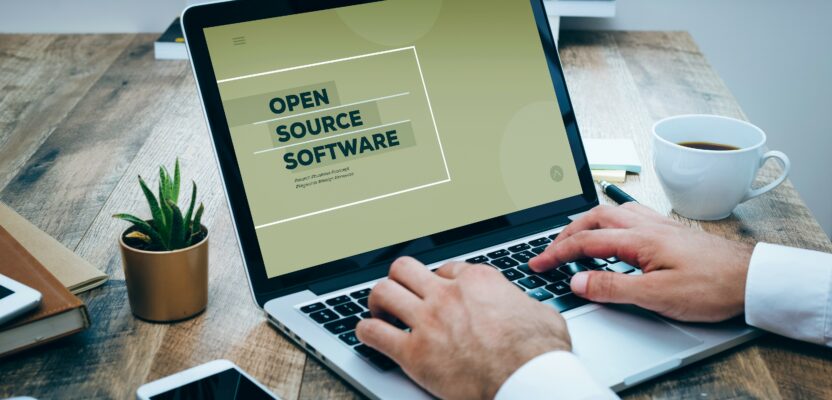Free and open-source software (FOSS) is sweeping across the IT industry, everywhere from office programs (LibreOffice) to GIS software (QGIS, R, Python). It is also being used extensively by large companies such as Microsoft, IBM, Amazon, and Netflix for their internal services as well as being used as building blocks to offer services to clients.
For example, Amazon Web Services (AWS) offers a range of Ubuntu (open source) virtual machines and Microsoft Azure have more instances running Linux than Windows.
Open-source software is very attractive, particularly to the increasing number of freelancers, because it costs nothing to get the software. However, often people have questions about how you get support for open-source software, and that is where commercial companies offering support come in.
How does Open-Source Work?
It used to be the case we paid—often hundreds of dollars—for a copy of Windows, Office, Photoshop, SimCity, or whatever software we wanted to use. Now, many of the big companies have moved to a subscription model where you pay a monthly fee to always have the latest copy of their software, including updates and new versions as they come out.
Many of the other products we use (Google search, Gmail, Google Docs, Facebook, Twitter) we don’t pay directly for, but those companies still have the expense of paying software developers. Nine times out of 10, that cost is covered using targeted advertising and targeted use of our personal data (“to make the adverts more relevant to you.”) So, instead of paying a monthly fee for these “free” platforms, we allow them to sell our personal data.
However, there is another option: FOSS, or free and open-source software. Many pieces of open-source software are available: LibreOffice, Thunderbird, Firefox, Ubuntu, QGIS, Inkscape, etc. “Free” in this context can mean two different things: “free as in speech” (libre) or “free as in beer” (gratis).
The focus for open-source software is “free as in speech” (i.e., LibreOffice), which is often promoted as allowing you to see the source code of the software and understand how it works. However, the big draw to FOSS is the “free as in beer” approach, meaning you can use the software without paying for it.
Yet, there is no such thing as a free lunch. This is as equally true for software that uses advertising and our personal data to pay for its development (i.e., Facebook, Google, etc.) as it is for FOSS, (which doesn’t have advertisements or use our data).
An amazing amount of software creation is done gratis, through the enthusiasm of volunteer contributors who can dedicate some of their time to developing this software. However, much of the vital (and sometimes less interesting) development must be paid for, such as bug fixing, website and infrastructure hosting, certification, making sure software works on a range of operating systems, etc. Therefore, if you use open-source software, it needs your contributions.
QGIS (and most other open-source programs) are free for anyone to download and use, and if you are just playing about with the software this is fine—there are lots of resources online for free for learning the software, and forum posts if you have questions.
However, if you are running a company that uses open-source software, it is quite reasonable to want some more formal support, if you have questions or if the software has bugs or doesn’t behave as it should.
Open-Source Support Options
A number of commercial companies offer support contracts for QGIS for an annual fee. Lutra Consulting (www.lutraconsulting.co.uk) is one of many companies across the world that offer this service. Support ranges from specialist support via email (next working day response time) to email and phone support (with either four-hour or two-hour response time), server optimization, and bespoke consultancy day. This could potentially include adding new features to QGIS, or guaranteed bug fixing. Lutra are experts in this area, being the first UK-based company offering QGIS Commercial Support.
One big benefit of open-source software support is that if the support company you have an agreement with doesn’t perform as you would like, you can take your money to a different company. If you have a support contract with the software manufacturer, you rely on their service only.
Several companies and local governments were using ArcGIS and decided to move to QGIS. Lutra Consulting helped them with their migration progress, and now support their use of open-source GIS software.
Extending Software
Unlike proprietary software, you can help shape the software development path of open-source software. For example, QGIS developers have regular crowdfunding initiatives to extend the software capabilities.
Recently, Lutra Consulting and North Road, two companies behind development of the QGIS, have successfully implemented support for lidar and point clouds in QGIS by direct contributions from users through crowdfunding (www.lutraconsulting.co.uk/blog/2021/11/02/pointcloud-qgis).
The contributions to such crowdfunding efforts are not only from individuals, but also large central and local government organizations that cannot afford to single-handedly fund all the development cost. Another great example is the development and integration of the TUFLOW Flexible Mesh format for QGIS. (www.lutraconsulting.co.uk/blog/2021/08/18/tuflow-case-study/).
Sponsorship
As well as paying for commercial support, there are many other ways of supporting open-source software. Sponsorship (of development of specific features) is one way, and a number of different companies run sponsorship drives regularly. Donations are also welcome, either to a specific piece of software (e.g., www.donate.qgis.org) or through OSGeo, the Open Source Geospatial Foundation (www.osgeo.org). OSGeo supports a range of open-source geospatial software and regularly donates and sponsors a wide range of tools and geospatial libraries. OSGeo also coordinates and runs the annual FOSS4G international conference (Free and Open Source Software 4 Geospatial, with the next one in Italy from August 22-27) with local chapters also running national FOSS4G conferences as well.

